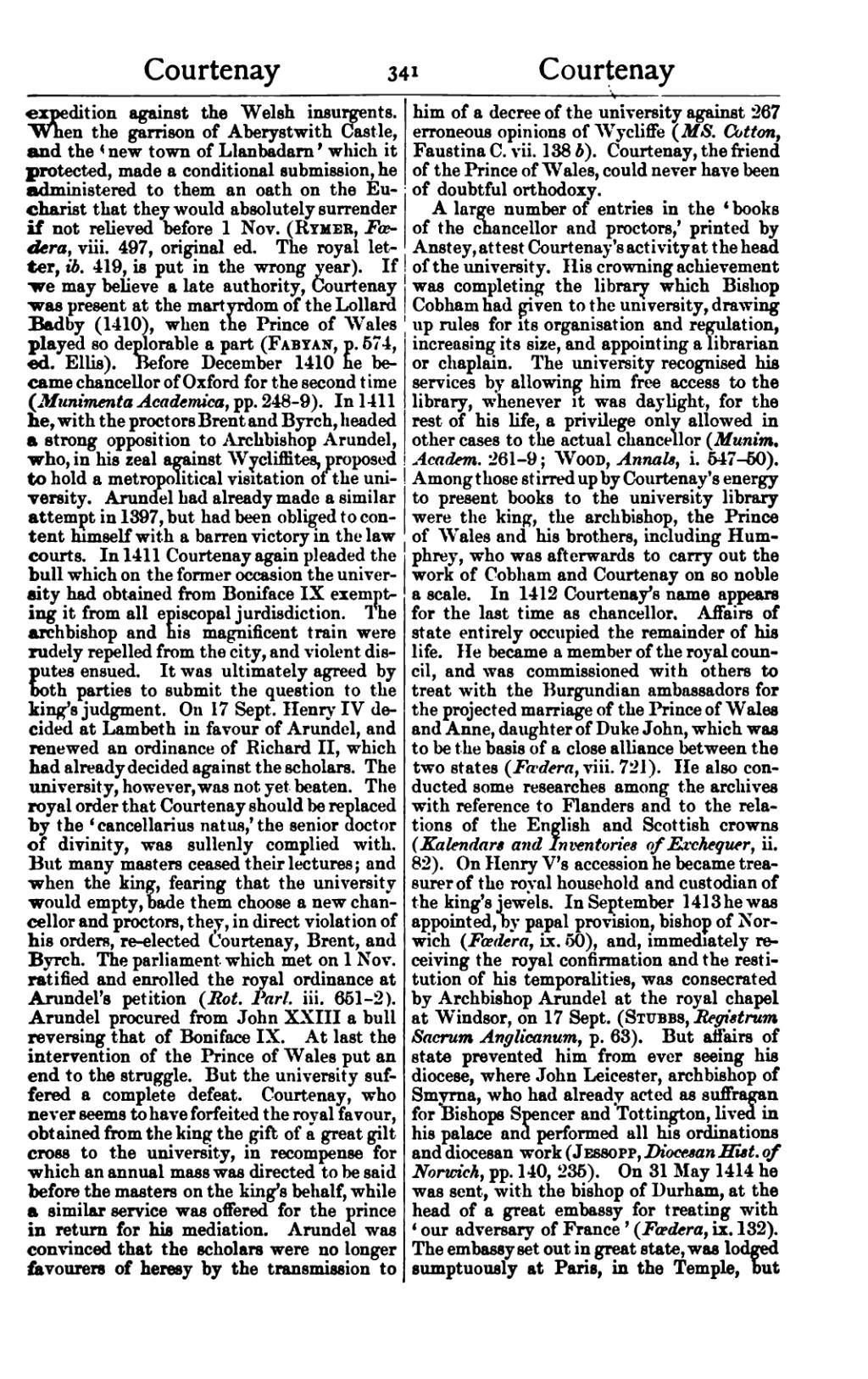expedition against the Welsh insurgents. When the garrison of Aberystwith Castle, and the ‘new town of Llanbadarn’ which it protected, made a conditional submission, he administered to them an oath on the Eucharist that they would absolutely surrender if not relieved before 1 Nov. (Rymer, Fœdera, viii. 497, original ed. The royal letter, ib. 419, is put in the wrong year). If we may believe a late authority, Courtenay was present at the martyrdom of the Lollard Badby (1410), when the Prince of Wales played so deplorable a part (Fabyan, p. 574, ed. Ellis). Before December 1410 he became chancellor of Oxford for the second time (Munimenta Academica, pp. 248–9). In 1411 he, with the proctors Brent and Byrch, headed a strong opposition to Archbishop Arundel, who, in his zeal against Wycliffites, proposed to hold a metropolitical visitation of the university. Arundel had already made a similar attempt in 1397, but had been obliged to content himself with a barren victory in the law courts. In 1411 Courtenay again pleaded the bull which on the former occasion the university had obtained from Boniface IX exempting it from all episcopal jurdisdiction. The archbishop and his magnificent train were rudely repelled from the city, and violent disputes ensued. It was ultimately agreed by both parties to submit the question to the king's judgment. On 17 Sept. Henry IV decided at Lambeth in favour of Arundel, and renewed an ordinance of Richard II, which had already decided against the scholars. The university, however, was not yet beaten. The royal order that Courtenay should be replaced by the ‘cancellarius natus,’ the senior doctor of divinity, was sullenly complied with. But many masters ceased their lectures; and when the king, fearing that the university would empty, bade them choose a new chancellor and proctors, they, in direct violation of his orders, re-elected Courtenay, Brent, and Byrch. The parliament which met on 1 Nov. ratified and enrolled the royal ordinance at Arundel's petition (Rot. Parl. iii. 651–2). Arundel procured from John XXIII a bull reversing that of Boniface IX. At last the intervention of the Prince of Wales put an end to the struggle. But the university suffered a complete defeat. Courtenay, who never seems to have forfeited the royal favour, obtained from the king the gift of a great gilt cross to the university, in recompense for which an annual mass was directed to be said before the masters on the king's behalf, while a similar service was offered for the prince in return for his mediation. Arundel was convinced that the scholars were no longer favourers of heresy by the transmission to him of a decree of the university against 267 erroneous opinions of Wycliffe (MS. Cotton, Faustina C. vii. 138 b). Courtenay, the friend of the Prince of Wales, could never have been of doubtful orthodoxy.
A large number of entries in the ‘books of the chancellor and proctors,’ printed by Anstey, attest Courtenay's activity at the head of the university. His crowning achievement was completing the library which Bishop Cobham had given to the university, drawing up rules for its organisation and regulation, increasing its size, and appointing a librarian or chaplain. The university recognised his services by allowing him free access to the library, whenever it was daylight, for the rest of his life, a privilege only allowed in other cases to the actual chancellor (Munim. Academ. 261–9; Wood, Annals, i. 547–50). Among those stirred up by Courtenay's energy to present books to the university library were the king, the archbishop, the Prince of Wales and his brothers, including Humphrey, who was afterwards to carry out the work of Cobham and Courtenay on so noble a scale. In 1412 Courtenay's name appears for the last time as chancellor. Affairs of state entirely occupied the remainder of his life. He became a member of the royal council, and was commissioned with others to treat with the Burgundian ambassadors for the projected marriage of the Prince of Wales and Anne, daughter of Duke John, which was to be the basis of a close alliance between the two states (Fœdera, viii. 721). He also conducted some researches among the archives with reference to Flanders and to the relations of the English and Scottish crowns (Kalendars and Inventories of Exchequer, ii. 82). On Henry V's accession he became treasurer of the royal household and custodian of the king's jewels. In September 1413 he was appointed, by papal provision, bishop of Norwich (Fœdera, ix. 50), and, immediately receiving the royal confirmation and the restitution of his temporalities, was consecrated by Archbishop Arundel at the royal chapel at Windsor, on 17 Sept. (Stubbs, Registrum Sacrum Anglicanum, p. 63). But affairs of state prevented him from ever seeing his diocese, where John Leicester, archbishop of Smyrna, who had already acted as suffragan for Bishops Spencer and Tottington, lived in his palace and performed all his ordinations and diocesan work (Jessopp, Diocesan Hist. of Norwich, pp. 140, 235). On 31 May 1414 he was sent, with the bishop of Durham, at the head of a great embassy for treating with ‘our adversary of France’ (Fœdera, ix. 132). The embassy set out in great state, was lodged sumptuously at Paris, in the Temple, but
